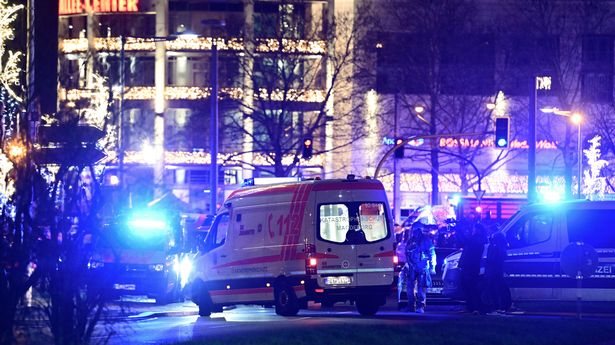Experts fear anti-immigrant tensions could boil over in Germany and beyond following the Christmas market attack.
Some 205 people were hurt, including 41 seriously, when a BMW sped through crowds in the town of Magdeburg on Friday evening. The alleged driver, named locally as doctor Taleb al-Abdulmohsen, originally from Saudi Arabia, was being quizzed on suspicion of murder, attempted murder and bodily harm.
More than 500 angry protesters marched through Magdeburg on Saturday night chanting anti-immigrant slogans, leading to clashes with police. And German chancellor Olaf Scholz was abused by a man, who said he should be "skinned alive" while looking at tributes at the scene earlier in the day.
Right-wing figures from across Europe have long criticised German authorities for having allowed high levels of migration, and for what they see as security failures now. Alternative for Germany, who the suspect had praised, has been polling strongly in recent times, particularly in the east of the country where the attack happened. And migration is likely to be a key issue when Germans head towards an early election on February 23.
Matthias Quent, Professor of Sociology at Magdeburg-Stendal University of Applied Sciences, said: "Magdeburg is in eastern Germany where the support for the AfD is quite high. So, in elections usually, they have in the region more than one-third of the votes. So about 30% of the votes in the city, not as much as in the rural areas around.
"The region in general, eastern Germany, is a hotspot of far-right mobilisations. This is not just a critical time because of Christmas and the trust that gets destroyed by such an attack but, also, regarding questions of disinformation and polarisation and the spread of hate that will and could happen over these kinds of attacks now."
Hungarian Prime Minister Viktor Orban, who is known for his strong anti-migration position, used the Christmas market attack to lash out at the European Union's migration policies. At an annual press conference in Budapest on Saturday, Mr Orban said: "There is no doubt that there is a link between the changed world in Western Europe, the migration that flows there, especially illegal migration and terrorist acts."
Mr Orban vowed to "fight back" against the EU migration policies "because Brussels wants Magdeburg to happen to Hungary, too". While Germany's Interior Minister Nancy Faeser expressed concern that the attack could be exploited by the far-right, but said little could be done to prevent seemingly coordinated gatherings.
She said: "We have freedom of assembly in this country. We have to do everything possible to make sure the attack isn't misused by either side."
